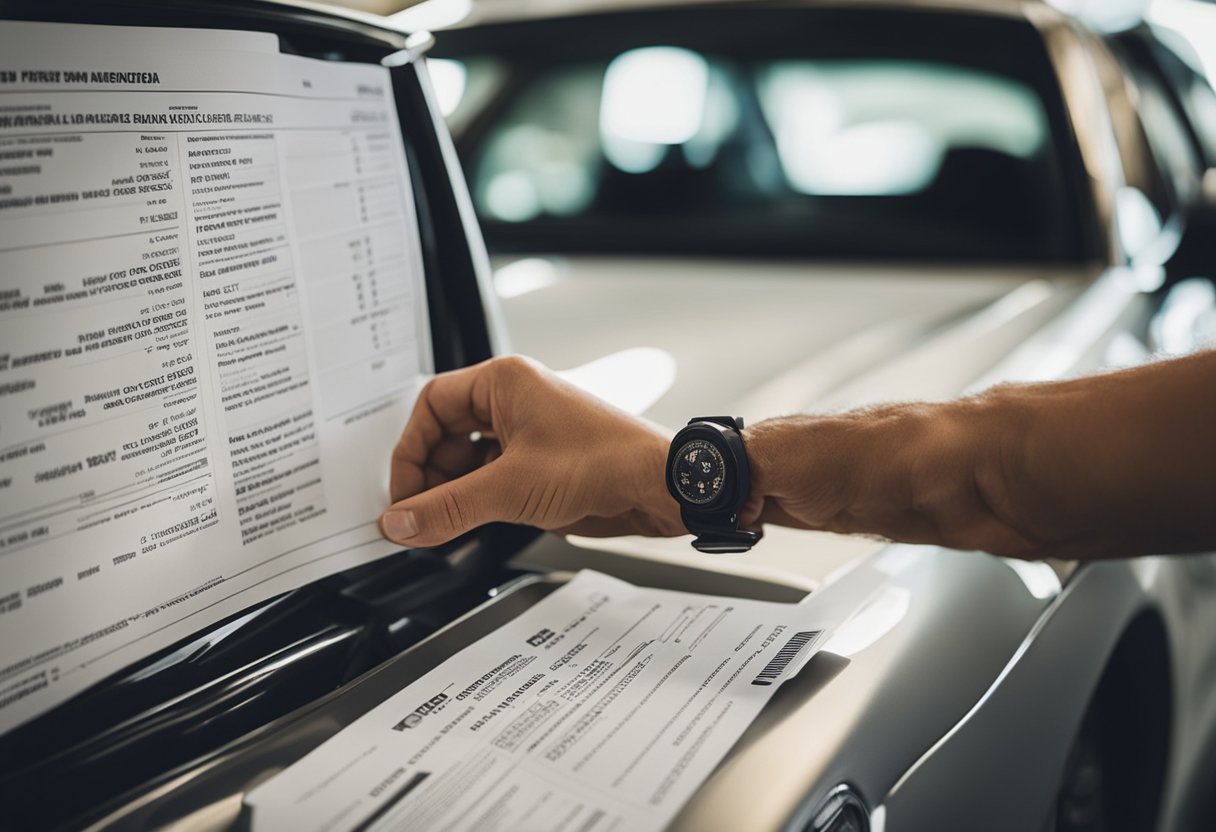When purchasing a vehicle, it’s crucial to be aware of the various red flags that could indicate a scam. The excitement of buying a car can sometimes overshadow the necessary diligence, leaving buyers vulnerable to dishonest sellers and fraudulent deals. Being equipped with the right information is the first line of defense against becoming a victim. Detecting a scam often involves looking for signs that suggest a deal may not be as legitimate or favorable as it appears.
Key signs of potential scams include an unrealistically low price that significantly undercuts market value, sellers who pressure for a quick sale, and requests for non-traditional payment methods such as gift cards or wire transfers. Scammers may also use practices like title washing to disguise the history of a car that may have been salvaged, or curbstoning, which involves selling vehicles in ways that avoid regulation typically applied to licensed dealers.
Another critical red flag is odometer fraud, where the mileage on the vehicle is altered to falsely represent the car’s usage. Ensuring that buyers understand these potential pitfalls when buying a car can help prevent financial loss and the purchase of unreliable or illegal vehicles. Always verify information, ask for documentation, and consider having the car independently inspected before finalizing any purchase.
Understanding Car Buying Scams
When navigating the process of buying a car, customers must be equipped with knowledge to identify and avoid scams. Fraudulent activities can have serious financial and legal consequences; thus, understanding the hallmarks of common scams is essential.
The Basics of Vehicle Scams
Vehicle scams occur when a buyer or a seller engages in deceptive practices during the car transaction process. Trust is often exploited as scammers pretend to be legitimate sellers or create fake listings. The consequences of such scams can range from financial loss to legal troubles, especially if a buyer unwittingly purchases a stolen car or one with hidden damage.
Common Types of Car Scams
Scammers deploy various tactics to defraud potential car buyers. Some prevalent types of car-buying scams include:
- Odometer Fraud: Altering the odometer to display a lower mileage than the vehicle has actually traveled.
- Title Washing: Concealing a car’s damaged history by transferring a salvage title across state lines to obtain a clean title.
- Curbstoning: Unlicensed dealers posing as private sellers to evade state regulations and sell problematic vehicles.
- Cloning: Replacing the Vehicle Identification Number (VIN) of a stolen car with one from a legally registered vehicle.
Online Marketplace and Internet Scams
With the rise of online marketplaces like Craigslist, AutoTrader, CarGurus, and eBay Motors, online car-buying scams have also increased. These may include:
- Phishing Schemes: Scammers may pose as sellers and attempt to harvest personal and financial information.
- False Advertising: Listings that misrepresent a vehicle’s condition or features to lure buyers.
- Fraudulent Payment Requests: Requests for payment or deposits via untraceable methods like gift cards or wire transfers.
Understanding and recognizing the red flags of these scams are key to a secure car-buying experience.
Recognizing Red Flags in Car Listings
When browsing car listings, one must be vigilant to spot potential scams. There are tell-tale signs that can alert a buyer to take a closer look or proceed with caution.
Suspiciously Low Prices
Below Market Value: An offer that seems too good to be true typically is. Listings featuring used cars priced significantly below market value are red flags. Scammers might attract buyers with low prices only to trap them with a fake escrow service or ask for wire transfers to secure the deal.
Vague or Overly Generic Descriptions
Generic Ad Copy: Pay attention to the description of the vehicle. A lack of specific details about the used car’s condition, history, or features could indicate that the seller doesn’t actually have the vehicle. Scammers often use general language to quickly create fake ads for non-existent vehicles.
Unusual Selling Circumstances
Questionable Seller Practices: Be wary of sellers who insist on rushing the sale, avoiding a vehicle history report, or refusing to meet in person. Situations where sellers ask for security deposits without meeting or disclosing the full accident history could be concealing a stolen car or hiding the fact that the car has been salvaged or is a VIN clone. Always insist on verifying the vehicle’s past and ensuring all transactions are legitimate.
Assessing Seller Authenticity

When purchasing a car, it is critical to confirm the legitimacy of the seller to avoid scams. This involves verifying identity, ensuring all documentation is correct and being attentive to any questionable communication.
Verification of the Seller’s Identity
One must confirm that the seller or dealership is reputable. A legitimate seller should be able to provide a valid license or proof of identity to prevent instances of identity theft. For private sellers, a quick check of their personal information against public records can reinforce trust. In the case of dealerships, verifying their existence through online databases or the Better Business Bureau can offer assurance.
The Importance of Proper Documentation
Any seller should provide the correct vehicle title and VIN (Vehicle Identification Number). A title shows ownership, while the VIN gives a vehicle’s history. Buyers should be wary of salvage titles or rebuilt titles, as these indicate the car has undergone significant repairs. Proper documentation should never suggest overpayment or ask for unnecessary personal details, which is a tactic often used in scams.
- Trustworthy documents include:
- Original vehicle title
- VIN that matches the vehicle
- No evidence of tampering or inconsistencies
Warning Signs in Seller Communication
Suspicious emails or messages that request the use of fake escrow services or pressure to share sensitive personal information are red flags. The language used in communication should be professional and free of urgency that pushes an immediate sale. Any mention of overpayment, requests for prepaid gift cards, or other unorthodox payment methods signal potential scams.
- Red flags in communication:
- Urgency: A push for quick sale without proper verification
- Unusual requests: Asking for overpayment or use of sketchy services
- Emails: Poorly written or generic messages that do not align with the seller’s purported identity
Vehicle History and Due Diligence

When purchasing a used car, a meticulous review of the vehicle’s history and a thorough physical inspection are indispensable. This due diligence helps to ensure that the car has not been subject to title washing, odometer tampering, and is not a damaged or a salvaged vehicle.
Checking Vehicle History Reports
A vehicle history report provides a wealth of information, including accident history, odometer readings, and recall notices. Services like Carfax and AutoCheck utilize the car’s Vehicle Identification Number (VIN) to consolidate these details. Always verify the VIN matches on all documents and the vehicle itself to prevent fraud.
Understanding Title History and Status
The title history discloses previous ownership and can reveal if the car has ever been designated as a salvage title or rebuilt—often due to flood damage or severe accidents. A title check can expose instances of title washing, where a vehicle’s branded title is masked by transferring it through states with lenient laws.
Performing a Physical Inspection
A comprehensive physical inspection must involve checking for signs of rust, mold, and flood damage. Inspecting the car for inconsistencies like uneven paint or fasteners that suggest tampering can uncover hidden damages. Additionally, a professional inspection can catch potential issues that may not be listed in the history report.
Secure Payment and Transaction Procedures

When purchasing a vehicle, understanding and implementing secure payment and transaction procedures is critical to avoid scams and ensure a legitimate purchase.
Avoiding Fraudulent Payment Methods
Buyers should approach payment methods with caution. The Federal Trade Commission advises against using gift cards or wire transfers for payments as they do not offer buyer protection. Scammers often request payment through these methods because they are virtually untraceable and non-recoverable. One should never use gift cards to make vehicle payments, as this is a common tactic in gift card scams.
Recognizing Safe Escrow and Transfer Processes
To facilitate a secure car buying transaction, using verified escrow services can be a safe method. A legitimate escrow account acts as a third-party holder of funds that secures the money until the vehicle has been delivered and all the conditions have been met. However, buyers should be aware of fake escrow service scams. It’s vital to verify the legitimacy of the escrow service by checking its credentials and ensuring it is recognized by the Federal Trade Commission. Avoid fraudulent wire transfers by confirming the bank details with the legitimate escrow service before sending any funds.
Legal Protection and Recourse
When considering the purchase of a vehicle, especially from online car sales platforms, buyers should be aware of their legal protections and avenues for recourse in case of fraud or misrepresentation. Understanding the role of federal regulations, consumer reports, and the proper channels to address potential problems provides a safety net for consumers.
Reporting to Authorities and Consumer Protection Agencies
Online Car Sales Scams: If a transaction seems suspicious or if a consumer believes they have been scammed, it is important to report the incident. Entities such as the Federal Trade Commission (FTC), Better Business Bureau (BBB), and the state Attorney General’s office are critical resources for filing complaints. The FTC enforces FTC rules that protect consumers from deceptive or unfair business practices in the auto market.
- FTC Complaints: Buyers can file a complaint with the FTC online through the FTC Complaint Assistant.
- BBB Reports: Concerns regarding a business can be reported to the BBB through their online complaint system.
- State Attorney General: Contacting a state’s Attorney General can provide local recourse and may trigger further investigation into fraudulent practices.
Understanding Your Rights as a Buyer
Consumer Rights and Auto Loans: A buyer’s rights extend to fair practices in auto lending. The FTC oversees the accuracy and privacy of credit reports, which can influence auto loan terms. Understanding one’s rights related to credit and loans when purchasing a vehicle, such as a certified pre-owned vehicle, is important for financial protection.
- Credit Report Accuracy: Consumers have the right to correct inaccuracies on their credit reports, which can be essential before taking on an auto loan.
- Privacy Rights: Protections under the Fair Credit Reporting Act ensure that a consumer’s information is handled with care by credit reporting agencies.
By staying informed of these legal protections, consumers can approach car purchases with greater confidence and security.
Additional Resources
In the pursuit of a sound vehicle purchase, buyers must equip themselves with an array of resources. Recognizing potential scams can protect unsuspecting buyers from outcomes like buying a severely damaged vehicle, or worse, a total loss. The following subsections offer educational material and tools to help mitigate these risks and facilitate a safer car buying or selling experience.
Educational Material on Car Buying
Educational resources play a pivotal role in informing consumers about the intricacies of car purchasing. The National Highway Traffic Safety Administration (NHTSA) provides ample guidance on vehicle safety standards, recalls, and VIN (Vehicle Identification Number) information, ensuring informed decisions. For those considering buying a car online, the Federal Trade Commission (FTC) is a treasure trove of information, offering insights into avoiding fraud and understanding buyer rights.
- NHTSA Resources: Check for safety recalls and VIN-related information.
- FTC Guidelines: Learn about consumer rights and how to spot deceptive practices.
Helpful Tools for Car Buyers
Tools tailored for car buyers can streamline the process and safeguard against scams. The FBI’s Internet Crime Complaint Center (IC3) provides a reliable platform for reporting and researching prevalent online scams, including those related to selling a car online. Additionally, verifying a car’s history through its VIN can unveil past accidents, usage, and service records, crucial for any buyer to avoid a potentially fraudulent deal.
- IC3 Complaint Center: Report and learn about online vehicle fraud.
- VIN Check Services: Utilize services to review a vehicle’s detailed history before purchase.
Frequently Asked Questions
Knowing the signs of a scam can make all the difference when buying a car. Educating oneself on the red flags can protect against fraudulent deals and ensure a legitimate purchase.
What indicators suggest a vehicle purchase might be fraudulent?
A vehicle purchase might be fraudulent if the price of the car is significantly below market value, or if the seller pressures for a quick sale without providing adequate verifiable information about the vehicle’s history or condition.
How can you recognize deceitful tactics in private car sales?
Deceitful tactics in private car sales often include sellers refusing to meet in person, avoiding direct answers about the vehicle’s history, or not allowing a pre-purchase inspection by an independent mechanic.
What are warning signs that a car deal is too good to be true?
Warning signs of a deal being too good to be true include unrealistically low prices compared to similar models in the market, ads claiming urgent sales for a quick deal, and sellers requesting payment through untraceable methods.
How can you identify a counterfeit payment in car transactions?
Counterfeit payments in car transactions may be identified by irregularities in payment documents, such as cheques bearing modifications or discrepancies in bank details. Sellers should always verify funds have cleared before transferring vehicle ownership.
What are the common tricks used by scammers on online car-buying platforms?
Common tricks used by scammers on online car-buying platforms include posting fake ads with photos of cars they don’t own, bait-and-switch schemes, and phishing attempts to gather personal and financial information from potential buyers.
How can you safeguard against deceit when selling a car to a dealer?
To safeguard against deceit when selling a car to a dealer, verify the dealer’s reputation through reviews and ratings, insist on detailed paperwork for all transactions, and avoid dealers who request upfront payments for services or appraisals.
